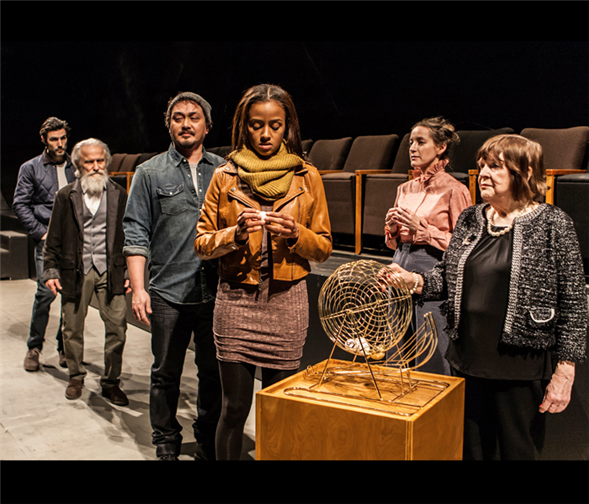Translate Page

Rotating roles in Branden Jacobs-Jenkins' new show
---
Even though the play has been running for several weeks, Michael Braun still doesn't know which part he's playing in Everybody. Or rather, he doesn't know which part he's playing next.
That's because during every performance of Branden Jacobs-Jenkins' play, now being produced by Signature Theatre, most of the roles are randomly assigned. After a few introductory scenes, a bingo-style spinning cage is rolled into view. It contains five white balls – each with a role written on it – and the actors select one at random. Whatever they draw is the part they'll play for the rest of the show.
During a recent matinee, for instance, Braun selected Everybody, the lead character. That evening, however, he was Friendship, a character that Everybody meets during a quest. In both cases, he had to assume his role immediately. There was barely time to take a few deep breaths, let alone make sure he remembered all his lines.
This might sound incredibly stressful. After all, the five performers in the "casting lottery" have to memorize the entire script, and they never know which section they'll be called to deliver. What's more, they can't rely on their scene partners to cover potential mistakes, since those people will be different as well.
Braun, however, is sanguine about the challenge. "The experience of performing the show with all these random elements in place is weirdly less stressful than most other shows," he says. "I feel like there's something about not knowing – about not being able to prime yourself for all five roles at the same time – that means you have this blank, empty-brain readiness. You're not worried about doing things the way you're 'supposed to.' This is a chance to just go."
{Image1}
There's something in Braun's perspective – in his willingness to accept the role he's given and just play it – that captures the spirit of the entire show. Because really, Everbody is asking all of us to take stock of what's happening in our lives at this very moment and decide how to move forward from there.
That makes sense, since Jacobs-Jenkins' script is based on Everyman, the allegorical morality play from the 15th century. In the original, Everyman is a single character, but he's also a representative for every human being in the world. He's approached by Death and told that it's time for his final judgment before God. If he wants, he can bring people with him to plead his case and accompany him to the afterlife, so he travels down a road, trying to convince figures like Kinship and Material Goods to be his companion. They all abandon him except Good Deeds, who stays by his side as he meets his maker.
The moral is obvious, and Jacobs-Jenkins has essentially left it unchanged. He uses contemporary language and references – and he adds a sharp twist to the final moment – but he still lets his play make a clear moral statement.
That feels rare in our postmodern age. "We talk about theatre as being a moral good, but we're quick to dismiss something for moralizing," says Jacobs-Jenkins. "We don't seem to want to release theatre from these moral imperatives, but we've somehow been trained to act like experiencing morals on stage is a bad thing."
However, our society has become far too diverse – religiously, socially, ideologically – for a simple rehash of the classic text. As Jacobs-Jenkins notes, "The question was, 'How do I make a play for a secular audience?' Because these morality plays in history appear in societies that are pretty religiously homogenous. The politics were closely intertwined with religious practices of the time."
This led to the idea that parts in Everybody are randomly assigned. Though some characters – including God and Death – are played by the same actors every night, the others, including Everybody, are always in flux. That means no single performer gets to own the symbolism of standing in, night after night, for the rest of us.
"It felt contradictory to me to create some kind of 'representative man' as belonging to one sort of body," the playwright says. "What I liked is that this freed us from having to be responsible for what an audience projected on any given set of bodies interacting with each other."
Plus, the casting lottery sends a jolt of electricity into the room. The audience is told what's happening when the balls are drawn, so we know that we're seeing a combination of actors and roles that may not have been seen before. Suddenly, the present moment feels especially urgent. These people playing universal ideas are also incredibly specific, because we've seen them at the exact moment they became Friendship or Kinship or Everybody.
"It reminds us that we're showing up at this super unique moment in time, and in some ways, that's what life is," says Jacobs-Jenkins. "You don't choose the life you wind up in, the time you wind up in, the history you wind up in. Yet at the same time, you can recognize your life in other lives. Life is the same across the board somehow."
---
Follow TDF Stages editor Mark Blankenship at @IAmBlankenship. Follow TDF at @TDFNYC.
Photos by Monique Carboni. Top photo: The 'Everybody' cast chooses roles for the evening.
TDF Members: Go here to browse our discounts for theatre, dance, and concerts.